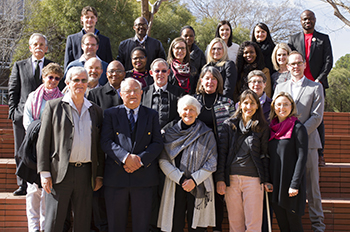
The UFS Department of Oncology celebrated 50 years of
existence. Prof Louis Goedhals says that the department
is like a family that will carry and support you.
Photo: Wendy Ruth
South Africa could see an increase of 78% in the number of cancer cases by 2030 and from a global perspective, a 75% increase is expected, increasing the total incidence of all new cancer cases from 12.7 million in 2008 to 22.2 million by 2030, according to a recent study published by medical journal Lancet. According to the Cancer Association of South Africa (CANSA), more than 100 000 South Africans are diagnosed each year. It is rather comforting that the University of the Free State’s (UFS) Faculty of Health Sciences has an Oncology department that has been fighting cancer for 50 years.
Excellence over the decades
The 50-year celebration of the Department of Oncology took place at the UFS Centenary Complex on the Bloemfontein Campus on 19 August 2017. The auspicious event was attended by UFS Faculty of Health Sciences registrars, radiation oncology radiographers and professional nurses who had trained in the department over the past 50 years, as well as the current departmental staff.
Dr Alicia Sherriff, Head of the Department of Oncology welcomed the dignitaries and thanked everyone for their attendance and dedication to the department, Prof Louis Goedhals, the oldest surviving head of department, gave a summary of the 50 years. He said once you were involved with this department you became part of a family that would carry and support you. Memories were shared and friendships rekindled. The message of this department that stood the test of time was: “To cure sometimes, to relieve often, to comfort always … and to bring hope”.
UFS dignitaries reveled in the moment
Among the special guests were the Rector and Vice Chancellor, Prof Francis Petersen, Prof Gert van Zyl, Dean of Faculty of Health Sciences; the Free State MEC for Health Mr Butana Komphela, and CEO of Universitas Hospital Dr Marcus Molokomme, were invited. The function was well attended by personnel, graduates from as far as Portugal, and dignitaries from the university. There was a sense of unity and belonging among all the attendees and enthusiastic catching up over the years that have passed.